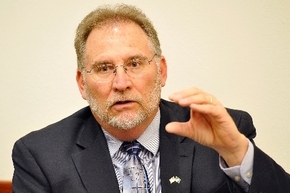Nevada, local government workers retiring later
CARSON CITY — Nevada’s state and local government employees are retiring at a much later age than just a decade ago, a trend that will have ramifications for the financial health of the $33.5 billion public pension plan.
Information generated by the Nevada Public Employees’ Retirement System through its actuary, Segal Consulting, shows the average retirement age of regular public sector workers in 2013 was 65, up from 59 in 2004.
The same trend has occurred for police and firefighters, for whom the retirement age in 2013 was 59 compared with 54 in 2004.
Most regular public employees can retire at age 60 with 10 years of service or at age 65 with five years. For police and fire, workers can retire at age 50 with 20 years of service or at 55 with 10 years. The average number of years of employment at retirement in 2013 was 19 for regular workers and 22.3 for police and fire.
So the data show that many public sector workers, from schoolteachers to city workers to state employees, are staying in their jobs later in life even though they are eligible to retire.
Tina Leiss, the retirement system’s executive officer, said there are a multitude of reasons for the shift, with health care costs likely one of the biggest.
“Retiree health care has a lot to do with it,” she said.
Medicare eligibility begins at age 65, so that the average retirement age for most public sector workers is now 65 likely isn’t coincidental, Leiss said.
Another factor is having an adequate retirement benefit, she said. For most public workers, their pension is worth 2.5 percent to 2.67 percent per year of service, so retiring later adds more to a retirement benefit.
“I get the feeling people want to hold onto their jobs longer,” she said.
There is a financial benefit to the retirement plan because workers who retire at a later age contribute to the system longer and don’t receive retirement benefits until the later age, Leiss said.
“Generally if employees retire at a later age it is going to be better for the fund,” she said.
There is an offset, however, because those who retire later usually have higher salaries, which means higher retirement benefits.
This is borne out by Segal’s data, which show the average monthly salary at retirement for regular employees in 2004 was $4,456, versus $5,024 in 2013.
And with increasing longevity of Americans in general, benefits will likely have to be paid out for a longer period, Leiss said.
One public employee who plans to push the average retirement age higher is Mike Willden, Gov. Brian Sandoval’s chief of staff.
Willden, 58, said there is no mystery about why he keeps working even though he could have retired years ago.
“I like to work around people,” he said. “I like the challenge, the stimulation. I don’t have a hobby. I don’t play golf. Family and work are the two things that are important to me.”
Willden started with the state Health and Human Services Department in August 1973.
He remained with the agency until earlier this year, when he took the job with Sandoval.
That start-of-service date of more than 40 years ago makes Willden the longest-serving active state employee.
Willden said he liked the work in human services and enjoyed helping people.
“I don’t have a retirement plan,” he said. “I don’t know how to retire. I will probably have to take a class.”
As for others, Willden said there might be a fear that they will run out of money if they retire too early.
“Longevity is likely a factor,” he said.
Nevada’s approximately 100,000 public employees may also simply be mirroring a national trend.
A Gallup poll released in April found that the average retirement age for American workers is now 62, the highest age since the polling company started compiling the data in 1991. In 1991, the average retirement age was 57.
“This likely reflects the changing landscape of retirement,” Gallup said, “including longer life spans, changes in Social Security benefits and employer-sponsored retirement plans, and lifestyle choices such as a desire to keep working after reaching the traditional retirement age.”
Social Security is not a factor for Nevada’s public sector employees, however, because they do not contribute to the federal retirement plan.
Leiss said the increasing retirement age will likely have a positive but limited effect on fully funding the state retirement plan.
The plan is about 69.3 percent fully funded as of 2013, which is a concern for some critics who advocate moving the public retirement plan toward a 401(k)-type plan where there would be no future liability to taxpayers.
An independent report released in 2013 by global human resources consultant Aon Hewitt gave the retirement program good marks, suggesting its unfunded liability will decline over the next 30 years, requiring lower taxpayer-backed contributions to keep fiscally healthy.
Contact Capital Bureau reporter Sean Whaley at swhaley@reviewjournal.com or 775-687-3900. Find him on Twitter: @seanw801.

















